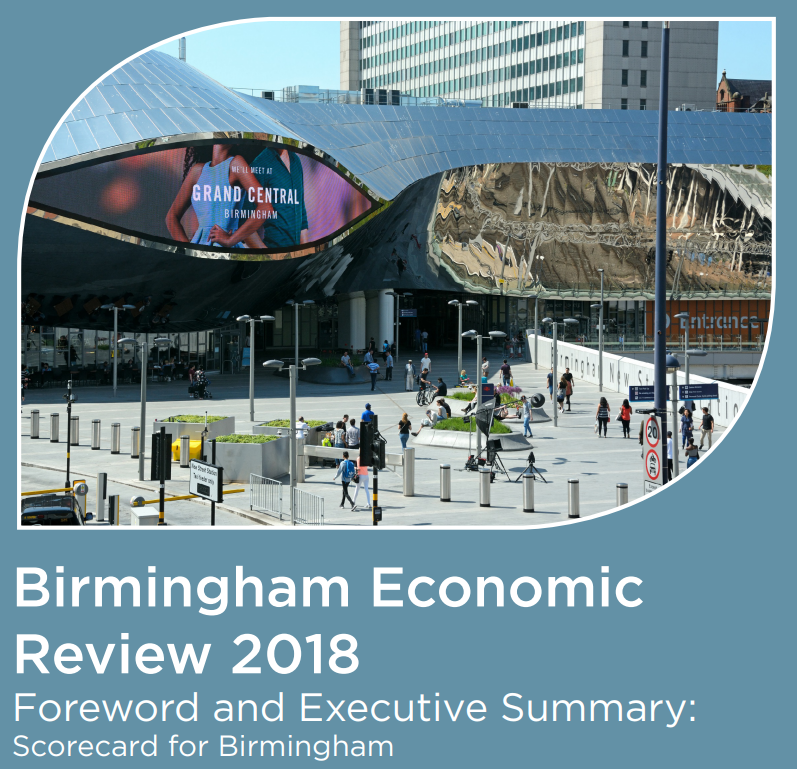 The Birmingham Economic Review was produced in October 2018 by City-REDI, the Greater Birmingham Chambers of Commerce and the West Midlands Growth Company.
The Birmingham Economic Review was produced in October 2018 by City-REDI, the Greater Birmingham Chambers of Commerce and the West Midlands Growth Company.
The review highlights the current strengths and weakness of the Birmingham economy, as well as looking at the opportunities and threats that might impact upon it in the future.
Over the next few weeks, we will be producing a series of blogs that provide an overview or comment on each chapter of the review, produced by members of the City-REDI team, the Greater Birmingham Chambers of Commerce, colleagues from the University of Birmingham and businesses from the region. This is a commentary from the Foreword and Executive Summary of the Review:
Key Challenges and Opportunities for Birmingham
There are incredible infrastructure developments coming into the city over the coming years and we have yet to see how these projects, especially the arrival of HS2 and the 2022 Commonwealth Games, will impact upon commuter flows in and out of Birmingham, perceptions of the city, and the concentration of different sectors within the region. We are already seeing firms turning their attention toward Birmingham. HSBC relocating the headquarters of their business bank to Birmingham is a milestone for the city and is already generating greater investment and attracting growth in the current business base. Businesses expect this to increase with the arrival of HS2 making travel between the capital and the second city even more efficient.
Nevertheless, it would be remiss to forget the issue of Brexit whilst looking ahead. As the details of the UK’s exit from the European Union continue to materialise, it will be important to consider how arrangements will impact upon Birmingham’s key industries and those of the region. There is already evidence showing that investment is stalling or slowing. However, Birmingham seems to be gaining as companies recognise they need to de-risk London costs and focus on regional offices. City-REDI’s analysis also shows that it is the Midlands and the North of England that are by far the most vulnerable to Brexit and are more exposed than any other region in Europe. This is because the Midlands and the North of England are much more dependent on EU markets for their trade than London, the SouthEast or Scotland. Our research also found that financial services are one of the least vulnerable sectors to Brexit, which is good news for Birmingham as this sector is seen to be fuelling the new revival of the city. The exposure to the sector is 8% of its GDP nationally. This is still significant, but it is low in comparison to many other sectors – largely because the financial services sector is already highly globalised and therefore displays a low dependence on EU markets. Our work into the sector has further reinforced this, demonstrating the sector is highly flexible and resilient and can see opportunities from Brexit as firms require more advice and support in the new post-Brexit world.
Brexit, however, is likely to exacerbate underlying challenges, and a key issue is tackling the skills gaps and very high local unemployment. Ensuring we build inclusive pathways into the expected growth in jobs is vital to ensure that the whole community thrives. Unlike many other cities, we have a young vibrant workforce and this could give us a competitive advantage, but we need to ensure strategy and policy support this and continues to attract skilled people and equip our young people with the opportunities to access growth.
In the absence of detail, however, it is important that Birmingham moves forward with confidence and builds upon the progress made over recent years so that the city can continue to develop and capitalise on the opportunities ahead. Key to this is continuing to change perceptions about the jobs, opportunities and lifestyle the city can offer to attract talent and investment.
Download a copy of the Birmingham Economic Review 2018.
This overview was written by Rebecca Riley, Administrative Director, City-REDI.
To sign up to our blog mailing list, please click here.
